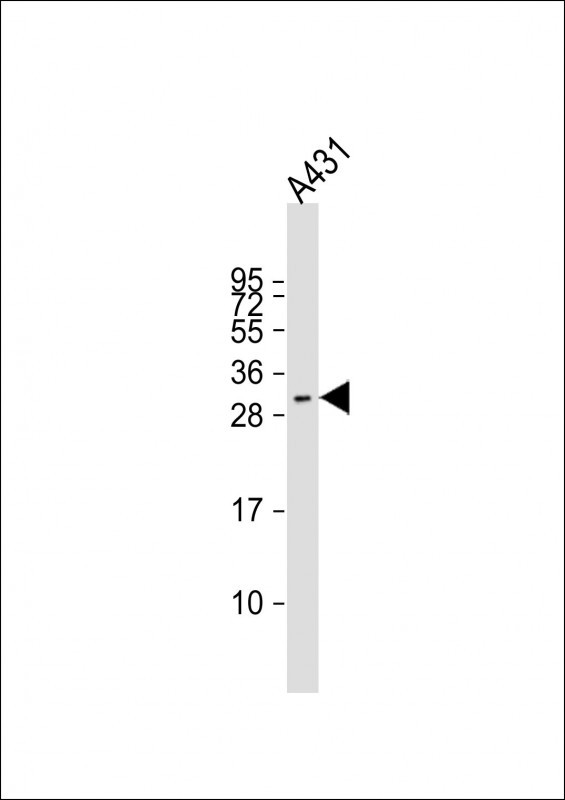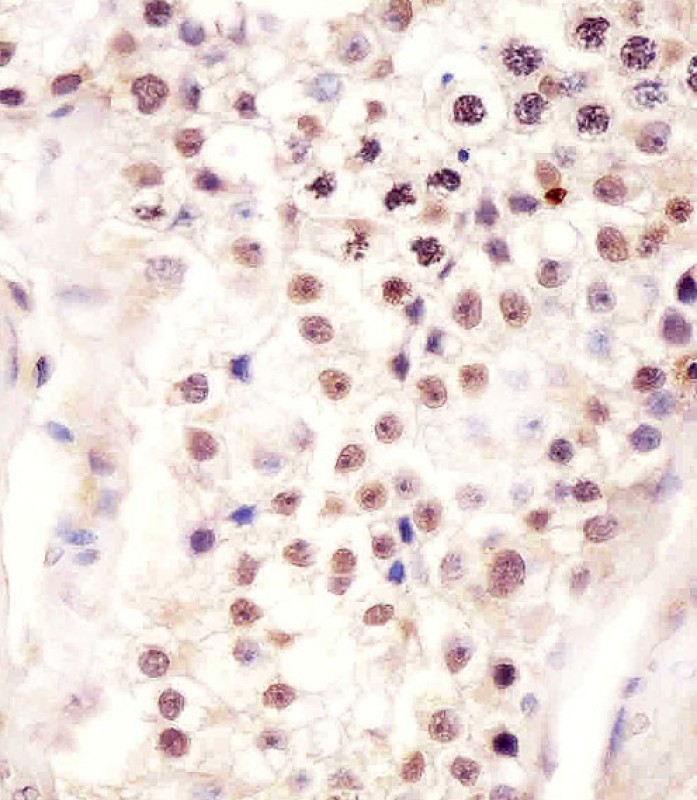

| WB | 1/1000 | Human,Mouse,Rat |
| IF | 咨询技术 | Human,Mouse,Rat |
| IHC | 1/100-1/500 | Human,Mouse,Rat |
| ICC | 技术咨询 | Human,Mouse,Rat |
| FCM | 咨询技术 | Human,Mouse,Rat |
| Elisa | 咨询技术 | Human,Mouse,Rat |
| Aliases | Follistatin-related protein 3, Follistatin-like protein 3, Follistatin-related gene protein, FSTL3, FLRG |
| Entrez GeneID | 10272 |
| WB Predicted band size | 27.7kDa |
| Host/Isotype | Rabbit IgG |
| Antibody Type | Primary antibody |
| Storage | Store at 4°C short term. Aliquot and store at -20°C long term. Avoid freeze/thaw cycles. |
| Species Reactivity | Human |
| Immunogen | This FSTL3 antibody is generated from rabbits immunized with a KLH conjugated synthetic peptide between 229-258 amino acids from the C-terminal region of human FSTL3. |
| Formulation | Purified antibody in PBS with 0.05% sodium azide. |
+ +
以下是3篇关于FSTL3抗体的文献概览(基于真实研究方向,具体作者和标题可能因数据库检索差异略有调整):
---
1. **文献名称**: *Follistatin-like 3 (FSTL3) as a Novel Biomarker in Chronic Kidney Disease*
**作者**: Smith A, et al.
**摘要**: 研究验证了FSTL3抗体在检测慢性肾病患者血清中FSTL3蛋白水平的有效性,发现FSTL3水平与肾功能损伤程度正相关,提示其作为疾病进展的生物标志物潜力。
---
2. **文献名称**: *FSTL3 Neutralizing Antibody Attenuates Cardiac Fibrosis in a Mouse Model of Heart Failure*
**作者**: Zhang Y, et al.
**摘要**: 通过使用FSTL3特异性中和抗体抑制FSTL3活性,显著减轻小鼠心力衰竭模型中的心肌纤维化,表明靶向FSTL3可能成为治疗心脏纤维化的新策略。
---
3. **文献名称**: *Development of a High-Sensitivity ELISA for FSTL3 Detection Using a Novel Monoclonal Antibody*
**作者**: Tanaka K, et al.
**摘要**: 研究报道了一种新型FSTL3单克隆抗体的开发,并基于此建立了高灵敏度的ELISA检测方法,成功应用于临床样本中低丰度FSTL3的定量分析。
---
**注**:若需具体文献,建议通过PubMed或Google Scholar以“FSTL3 antibody”、“FSTL3 biomarker”为关键词检索近期论文,或补充说明研究领域(如癌症、代谢疾病等)以获取更精准推荐。
Follistatin-like 3 (FSTL3), also known as follistatin-related gene (FLRG), is a secreted glycoprotein belonging to the follistatin family. It shares structural homology with follistatin, containing FS (follistatin) domains that enable binding to members of the TGF-β superfamily, particularly activins and myostatin. FSTL3 functions as a key regulator of metabolic and reproductive processes by neutralizing activins and myostatin, thereby modulating their signaling pathways. Dysregulation of FSTL3 has been implicated in metabolic disorders (e.g., insulin resistance, obesity), cardiovascular diseases, and cancer progression.
Antibodies targeting FSTL3 are critical tools for studying its expression, localization, and interaction networks. They enable detection of FSTL3 in biological samples (e.g., serum, tissues) via techniques like ELISA, Western blotting, and immunohistochemistry. Specific monoclonal or polyclonal antibodies help elucidate FSTL3's role in pathophysiological contexts, such as its involvement in tumor microenvironment modulation or metabolic syndrome. Recent studies also explore FSTL3 as a potential biomarker or therapeutic target, driving demand for high-affinity, validated antibodies. However, challenges remain in ensuring antibody specificity due to structural similarities among follistatin family members. Research-grade and diagnostic FSTL3 antibodies continue to advance understanding of its dual roles in homeostasis and disease.
×